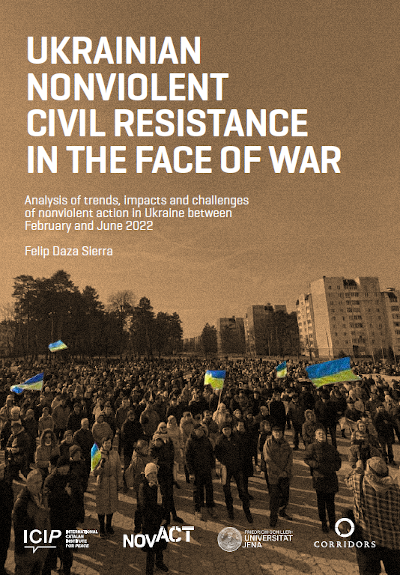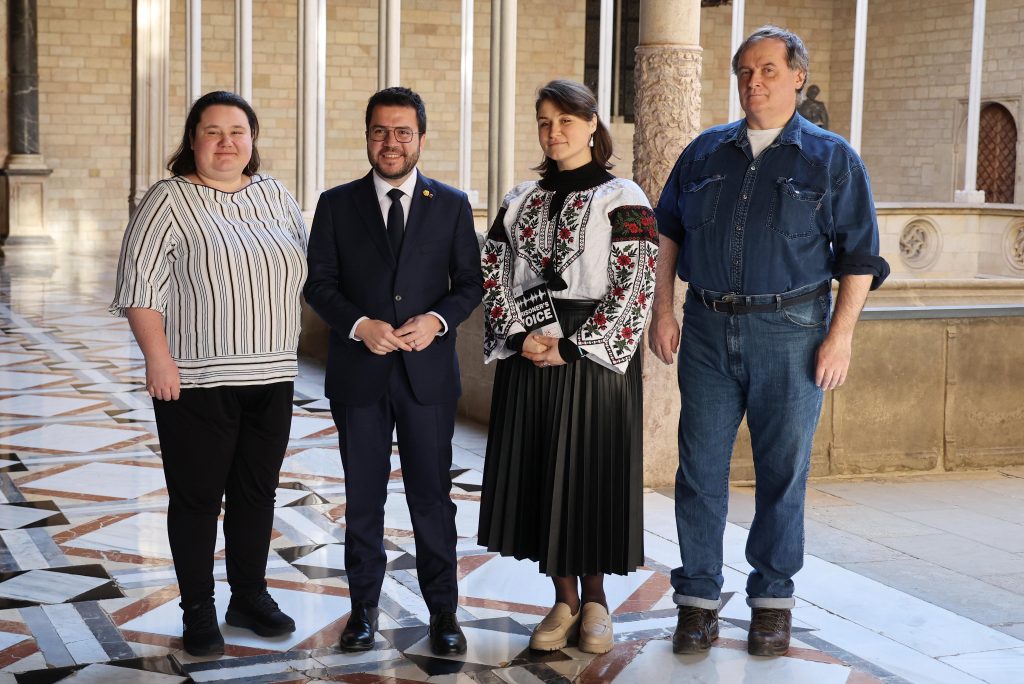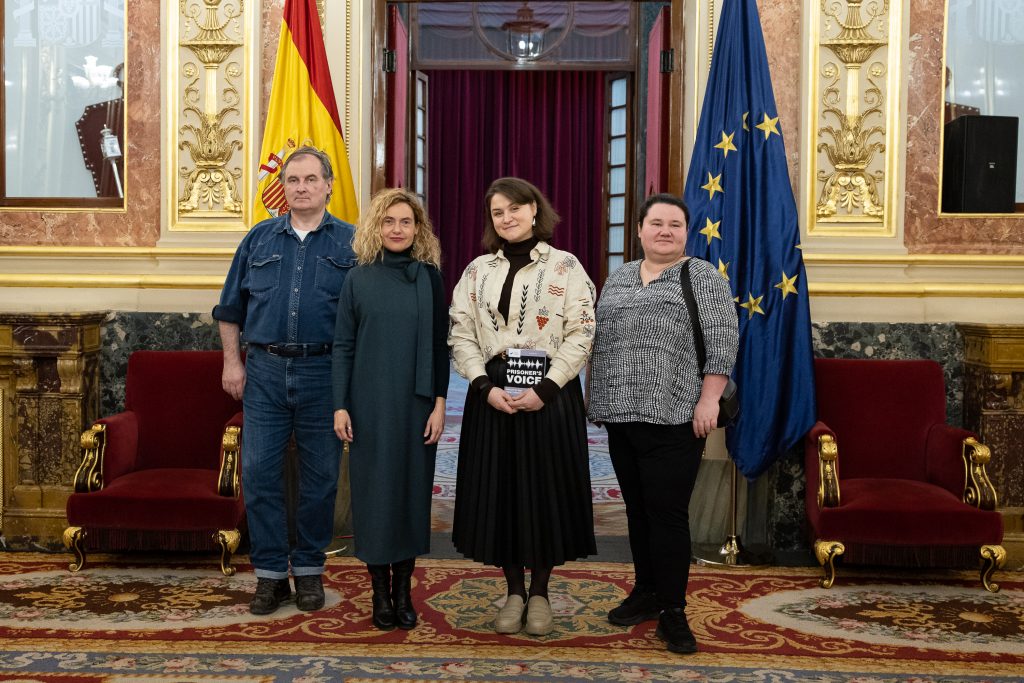The strength of nonviolence in Ukraine

Since the beginning of the Russian invasion of Ukraine, Ukrainian civil society has spontaneously and courageously organized to counter the military occupation through hundreds of nonviolent actions, including civil disobedience, road blockades, civilian evacuation or communication campaigns.
The report Ukrainian Nonviolent Civil Resistance in the Face of War, prepared by Professor Felip Daza within the framework of a joint ICIP and Novact project, examines the Ukrainian nonviolent civil resistance between February and June 2022 to identify the organizational dynamics and the characteristics of the different actions, their evolution and the impacts and supports they have achieved.
The work confirms that some resistance actions contributed to stopping the invasion in the country’s north and hindered the institutionalization of the military occupation in its early stages. Likewise, nonviolence has created conditions and strategies to maintain social cohesion and community resilience in the face of fear and uncertainty caused by the invasion. It has also strengthened local governance, thanks to the empowerment of social actors and better coordination with local authorities.
Organized civil society has also allowed the construction of a comprehensive system for the development of evacuation, transportation and relocation tasks for people affected by the violence. Likewise, the work of monitoring war crimes carried out by human rights defence organizations has prevented the legal defenselessness of the population and has empowered communities to report abuses.
According to the author of the report Felip Daza, “the nonviolent civil response of the Ukrainian people is a unique experience that can serve as inspiration for other armed conflicts, but above all, it is the seed to rebuild the country and weave regional alliances to stop the barbarity of war”.
The Ukrainian Nonviolent Civil Resistance in the Face of War report has been published in the ICIP Reports collection as a joint project with Novact and with the collaboration of Friedrich-Schiller-University Jena and the German NGO Corridors. The work is available in electronic format in English, Catalan, Spanish and Ukrainian.
The research is based on fieldwork on the ground, carried out between April 2 and 18, 2022, by the author Felip Daza and the photographer and camera operator Lorena Sopena. During the stay, data and witnesses were collected from interviews with 55 political and social actors in the country, including representatives of public institutions, NGOs, activists, academics and religious institutions.
Information collection has enabled an interactive map with 235 verified and systematized nonviolent actions from February 24 to June 30, 2022. The registered steps are divided into three types: acts of protest and dissuasion (148), movements of nonviolent intervention (51) and measures of non-cooperation (36).
Based on the mission, ICIP and NOVACT have produced videos dealing with issues such as war crimes investigation, community organizing, and the role of feminist organizations in Ukraine.
These videos are available to people and groups who want to use them to publicize initiatives that go beyond the use of weapons.
Visit to Barcelona and Madrid of the three initiatives awarded the 2022 Nobel Peace Prize
On the 29th, 30th and 31st of January 2023, a delegation formed by the entities awarded the Nobel Peace Prize 2022 met various Catalan and Spanish institutions to vindicate civil society’s role in promoting peace, justice and democracy in East Europe. The ICIP and the NOVACT Institute of Nonviolence organized the visit.
The Center for Civil Liberties (Ukraine), the ICIP and the NOVACT Institute of Nonviolence, in dialogue with the Center for Human Rights Memorial (Russia) and the Center for Human Rights of Viasna (Belarus), agreed on a document with set proposals to reinforce the role of civil society and promote peace, human rights and democracy in Ukraine, Russia and Belarus. This document was delivered at various institutional meetings in Barcelona and Madrid.
The delegation was formed by Oleksandra Romantsova, executive director of the Center for Civil Liberties (Ukraine); Natallia Satsunkevich, member of the Interim Board of the Center for Human Rights of Viasna (Belarus) and Alexander Cherkasov, president of the Board of the Center for Human Rights Memorial (Russia).
During the different institutional visits, the delegation delivered to the different authorities exemplars of the report Ukrainian Nonviolent Civil Resistance in the Face of War.


The Russian invasion of Ukraine began on February 24, 2022. Around 6 a.m. Moscow time, Russian President Vladimir Putin announced a “special military operation” in the east of the country; minutes later, the first missile attacks took place in various parts of the country, including the capital Kyiv.
In addition to the humanitarian, economic, political and environmental consequences, the war started by Putin has had a disastrous impact on peacebuilding efforts, not only in Ukraine but in Europe and worldwide, an aspect that was already included in the ICIP’s statement that we published the same day the war started.
- Wagner Group Unchained in Ukraine. Military, political and human rights impact of the Wagner Group since the large-scale invasion in 2022, report by NOVACT with the financial support of ICIP – September 2023.
This report is based on fieldwork conducted between March and June 2023. It was also presented at the United Nations headquarters on August 1st in New York City as part of the working session of the United Nations Working Group on the use of mercenaries.
The research includes testimonies from 40 experts, institutions, and Civil Society Organizations from the academic and human rights fields. Military personnel involved in operations on the Ukrainian side were also interviewed. The presence of the Wagner Group in Ukraine has dramatically escalated the gravity of the conflict, exacerbating mortality rates, intensifying confrontation, and leading to the fragmentation of non-state armed actors.
- A ceasafire and peace for Ukraine, per IPPNW Germany (International physicians for the prevention of nuclear war)
- “Reclaiming universal jurisdiction“, by Sabina Puig (ICIP)
In this article, the author reclaims to rehabilitate the principle of universal jurisdiction in order to investigate the crimes of war in Ukraine and guarantee the victims their rights to truth, justice, reparation and non-repetition. As the author says, “if the war crimes, crimes against humanity and genocides of the last decades had been prosecuted more vigorously, then the victimizers would probably not feel so strongly that in war, everything goes and that excess does not entail consequences”.
- “Reflections on the Russian invasion from a pacifist perspective“, by Pablo Aguiar (ICIP)
During this time of war, Aguiar defends moving towards institutional architectures that guarantee the security of all the countries of the European continent and that guarantee peaceful management of conflicts. Because the alternative is to increase military spending and to move closer, perhaps fatally, to a new war.
- “Security in times of war“, by Sandra Martínez (ICIP)
Militarism alone has never translated into positive conflict management; on the contrary, it has trapped, displaced or worsened them in the medium and long term. So, what kind of security are we talking about in these days of the offensive in Ukraine? From whom and for whom? In this article, the head of the “Alternatives of Security” area of the ICIP claims the need to seek mechanisms for solidarity and shared security to prevent violence and the arms race.
- “How do we respond to Putin’s war?“, by Kristian Herbolzheimer (ICIP)
In this article, ICIP’s director explains that the debate on whether or not to supply weapons is a perverse dilemma because either answer entails the death of thousands of people.
- ‘Putin might be winning the military battle but he has lost the moral one’, by Kristian Herbolzheimer (ICIP)
In this interview, Herbolzheimer talks about the dimension of the conflict between Russia and Ukraine, something “beyond what was thinkable for anybody,” the ICIP director said. “Where we are right now, there are no good options, all options are bad,” he told this media outlet.
- “War in Ukraine: Peace Frameworks and Initiatives“, by Kristian Herbolzheimer (ICIP)
In this article, the director of ICIP writes about the historical references of understanding between the parties to the conflict. He also writes about the diplomatic and social initiatives of dialogue that have been deployed for years in the region, since of a local and European framework.
- “What would real peacebuilding in Ukraine look like?”, by Almut Rochowanski (WILPF, Women’s International League for Peace and Freedom)
This article covers the initiatives of relaxation and dialogue that have taken place in recent decades to address the conflict between Russia and Ukraine and advocates a peace-building strategy focused on people, human security and feminism.
- “It’s time to ask: what would a Ukraine-Russia peace deal look like?“, by Anatol Lieven (Quincy Institute for Responsible Statecraft)
In this article published in The Guardian, the author calls for a dialogue solution to end the war and points out some of the issues that should be on the table.
- “A Just Peace for a Besieged Ukraine“, by Fernando Travesí (ICTJ)
More than 4 million Ukrainians are now refugees; another 10 million are internally displaced, and a rising but still undetermined number have been killed, are missing, or are wounded. The real question is what just peace means for Ukrainians.
- “War in Ukraine: Do Negotiations Stand a Chance?“, by Initiative Mediation Support Deutschland (IMSD)
With the atrocities against civilians in Butcha and other Ukrainian cities reported in early April, the violence and inhumanity of the ongoing war have entered a new degree of visibility. For some, this means negotiations are completely discredited; for others, negotiations are even more imperative.
This document was developed by Ukrainian mediators and dialogue facilitators in May 2022 to convey their voices and professional opinion to prominent actors in the international sphere of conflict transformation
